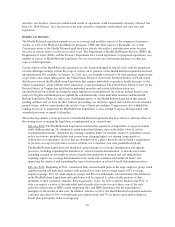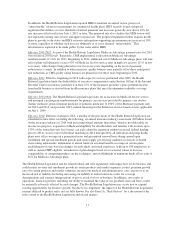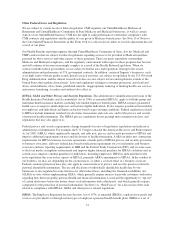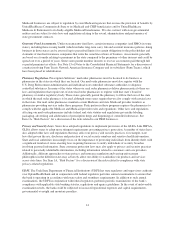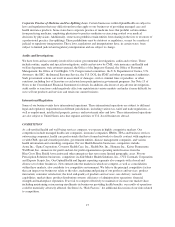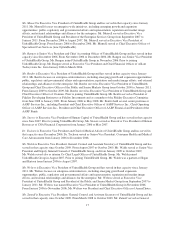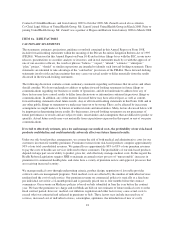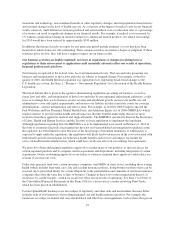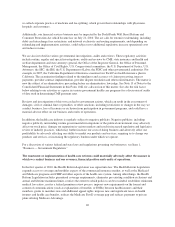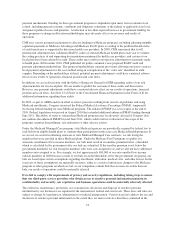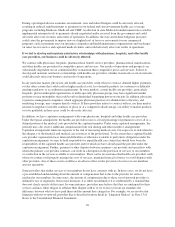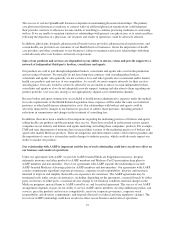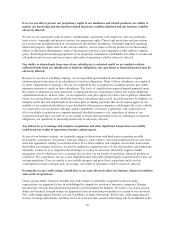United Healthcare 2010 Annual Report Download - page 22
Download and view the complete annual report
Please find page 22 of the 2010 United Healthcare annual report below. You can navigate through the pages in the report by either clicking on the pages listed below, or by using the keyword search tool below to find specific information within the annual report.so-called corporate practice of medicine and fee-splitting, which govern their relationships with physicians,
hospitals and customers.
Additionally, our financial services business may be impacted by the Dodd-Frank Wall Street Reform and
Consumer Protection Act which became law on July 21, 2010. The act calls for extensive rulemaking, including
debit card interchange fees restrictions, and network exclusivity and routing requirements, and depending on
rulemaking and implementation activities, could subject us to additional regulation, increase operational costs
and reduce revenue.
We are also involved in various governmental investigations, audits and reviews. These regulatory activities
include routine, regular and special investigations, audits and reviews by CMS, state insurance and health and
welfare departments and state attorneys general, the Office of the Inspector General, the Office of Personnel
Management, the Office of Civil Rights, U.S. Congressional committees, the U.S. Department of Justice, U.S.
Attorneys, the SEC, the IRS, the U.S. Department of Labor, the FDIC and other governmental authorities. For
example, in 2007, the California Department of Insurance examined our PacifiCare health insurance plan in
California. The examination findings related to the timeliness and accuracy of claims processing, interest
payments, provider contract implementation, provider dispute resolution and other related matters. The matter is
now the subject of an administrative proceeding before an administrative law judge. See Note 13 of Notes to the
Consolidated Financial Statements in this Form 10-K for a discussion of this matter. See also the risk factor
below relating to our activities as a payer in various government health care programs for a discussion of audits
of data used in determining CMS payment rates.
Reviews and investigations of this sort can lead to government actions, which can result in the assessment of
damages, civil or criminal fines or penalties, or other sanctions, including restrictions or changes in the way we
conduct business, loss of licensure or exclusion from participation in government programs, and could have a
material adverse effect on our business and results of operations.
In addition, the health care industry is regularly subject to negative publicity. Negative publicity, including
negative publicity surrounding routine governmental investigations or the political environment, may adversely
affect our stock price, damage our reputation in various markets and result in increased regulation and legislative
review of industry practices, which may further increase our costs of doing business and adversely affect our
profitability by adversely affecting our ability to market our products and services, requiring us to change our
products and services, or increasing the regulatory burdens under which we operate.
For a discussion of various federal and state laws and regulations governing our businesses, see Item 1,
“Business — Government Regulation.”
The enactment or implementation of health care reforms could materially adversely affect the manner in
which we conduct business and our revenues, financial position and results of operations.
In the first quarter of 2010, the Health Reform Legislation was signed into law. The Health Reform Legislation
expands access to coverage and modifies aspects of the commercial insurance market, as well as the Medicaid
and Medicare programs and CHIP and other aspects of the health care system. Among other things, the Health
Reform Legislation includes guaranteed coverage requirements, eliminates pre-existing condition exclusions and
annual and lifetime maximum limits, restricts the extent to which policies can be rescinded, establishes minimum
medical loss ratios, creates a federal premium review process, imposes new requirements on the format and
content of communications (such as explanations of benefits, or EOBs) between health insurers and their
members, grants to members new and additional appeal rights, imposes new and significant taxes on health
insurers and health care benefits, reduces the Medicare Part D coverage gap and reduces payments to private
plans offering Medicare Advantage.
20


